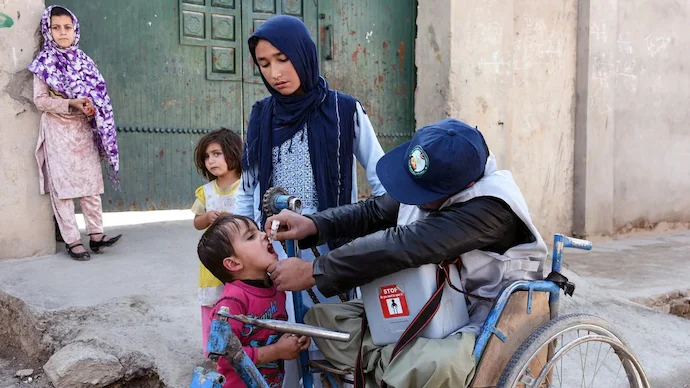Polio Vaccination Campaign
KABUL: The Afghan Taliban have recently suspended the door-to-door polio vaccination campaign across the country, according to a confirmation from the United Nations (UN).
This decision has raised serious concerns within the international community, with the UN describing it as a severe setback in the ongoing battle against polio.
The suspension threatens to undermine the progress made in controlling this debilitating disease. Polio, a virus that can lead to paralysis and other severe health issues, has never been fully eradicated in Afghanistan, which remains one of the last two countries where the disease is still endemic.
The other country grappling with this challenge is Pakistan. The recent decision by the Taliban to halt the vaccination campaign is expected to have far-reaching consequences not only for Afghanistan but also for the surrounding region and beyond.
The UN reported that the suspension was announced just before the scheduled start of the September immunization drive.
The Taliban-controlled government has yet to provide an official explanation for this abrupt decision, and there has been no immediate comment from their side regarding the suspension.
International media have reported that discussions are underway within the World Health Organization (WHO) about potentially shifting from traditional house-to-house vaccination efforts to alternative methods, such as conducting immunizations in mosques.
This change is being considered as a response to the suspension, aiming to ensure that vaccination efforts continue despite the halt in the usual approach.
The implications of the Taliban’s decision are substantial. The UN has highlighted that the suspension could lead to a resurgence of polio cases, which would be particularly concerning given the persistent presence of the virus in Afghanistan.
This resurgence could potentially spread to neighboring countries, exacerbating public health challenges across the region.
So far, the WHO has reported 18 cases of polio in Afghanistan this year, marking an increase of six cases compared to the previous year. This rise in cases underscores the critical need for continued vaccination efforts to prevent further spread of the disease.
The halt in the vaccination campaign is especially alarming as it could reverse the gains made in the fight against polio and undermine regional health security.
The UN and WHO have expressed deep concern about the potential for the Taliban’s decision to have a negative impact on public health efforts in the region.
The continuation of the vaccination campaign is crucial for controlling the spread of polio and ensuring that the disease does not make a comeback, affecting the health and well-being of children and communities in Afghanistan and neighboring areas.
I am a dynamic professional, specializing in Peace and Conflict Studies, Conflict Management and Resolution, and International Relations. My expertise is particularly focused on South Asian Conflicts and the intricacies of the Indian Ocean and Asia Pacific Politics. With my skills as a Content Writer, I serve as a bridge between academia and the public, translating complex global issues into accessible narratives. My passion for fostering understanding and cooperation on the national and international stage drives me to make meaningful contributions to peace and global discourse.










